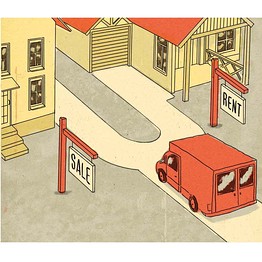Amy Hoak
Other


Thomas Kuhlenbeck
It used to be a no-brainer: Buy. Period.
Over 70% of Canadian households are owner-occupied, and home ownership has always been seen as the road to financial stability.
But in Metro Vancouver, housing is the least affordable in Canada. Buying a detached bungalow will eat up 91% of an average household’s income, and buying a condo will take around 45%.
Considering property taxes, utilities, insurance and the costs of maintaining a home — on top of mortgage payments — renting may be a better option for some people.
This article from the Wall Street Journal sets out six factors to consider when you’re deciding whether to buy or rent. And while the article was written for Americans, whose real estate market has been in the basement for three years, these six steps to making a buy-or-rent decision will work for any market:
1. Examine the housing market
2. Consider additional costs
3. Look into the future
4. Look into your personal future, too
5. Consider your personal finances
6. Think a bout opportunity costs
Making a New Case for Home Buying
As another year of the housing downturn ends, some are wondering if it finally is more advantageous to buy instead of rent, given discounted home prices and mortgage rates near historical lows.
The answer not only depends on where you live, but also your personal finances, the stability of your job and what you expect for home prices and rental rates in the years ahead.
Historically, renting has been the better choice, according to recent research.
Renting was the better move about 75% of the time, according to “Lessons from Over 30 Years of Buy versus Rent Decisions: Is the American Dream Always Wise?” a paper scheduled for publication next year.
The catch: Renters need to invest all the money they save.
“We find that if people don’t invest the money, actually about 90% of the time, you’re better off buying,” says Eli Beracha of East Carolina University, who co-authored the paper with Ken H. Johnson of Florida International University.
That’s because for many Americans, their home has become a sort of forced savings account, allowing them to build savings through home equity.
That said, the case for buying a home is getting more compelling for many, according to the report, especially as monthly mortgage payments become more competitive with rental payments.
Here are six considerations for those weighing a decision to buy or rent.
1 Examine the housing market
One metric that housing analysts will look at to gauge housing affordability is the price-to-rent ratio. To calculate the ratio, the purchase price of a house is divided by 12 times the monthly rent of a comparable home, says Stan Humphries, chief economist for real-estate website Zillow.com.
Hard-hit markets like Detroit and Las Vegas have low median price-to-rent ratios of 5.6 and 8.1, respectively, according to Zillow data. At the other end of the list, it’s still expensive to buy in New York and Honolulu, with ratios of 16.1 and 17.6, respectively.
“There is no rent ratio that is the magic number,” says Christina Aragon, Rent.com’s director of strategy and consumer insights. But in general, “the higher the ratio is above 20, the more you’d need to see a spike in housing values to justify the price that you’re paying today. If the ratio is below 15, it might make sense to consider buying rather than renting,” she adds.
2 Consider additional costs
Remember, if you choose to buy a home, your mortgage payment may be the biggest cost each month—but it’s not the only one.
There are insurance and taxes to pay, as well as regular maintenance costs, says Richard Green, director of the University of Southern California’s Lusk Center for Real Estate.
3 Look into the future
After taking stock of what the housing market is like today, you have to do some predicting about what the local economy, including the housing market, will look like in the future, Ms. Aragon says.
Are jobs coming into the area, or are they leaving town? Is there enough demand for housing that prices will rise over the time you will live there?
Right now, housing prices are still falling, and rental prices are rising in many parts of the country. Nationwide, home prices were down 4.4% in September, compared with September 2010, Mr. Humphries says. Prices may drop another 3% to 5% before bottoming, he adds.
4 Look into your personal future, too
Before buying, decide how long you plan to live in the home. If you plan to stay there for 10 years, a drop in value a year after you move in could be balanced out by many more years of price appreciation.
If you plan to live in the home less than five years, you may be better off signing a lease, Mr. Humphries says.
5 Consider your personal finances
Assess whether you have the down payment—and if that down payment would wipe out savings you might need for a rainy day, Ms. Aragon says. “Does having that burden of a mortgage mean you can’t do things that are important for your lifestyle like take a vacation or go out to dinner?” she asks.
These days more than ever, potential homeowners need to consider the stability of their jobs before they take on a mortgage. Also being able to move when you have an opportunity to advance your career may be a compelling reason to rent.
6 Think about opportunity costs
Shelling out 20% for a down payment has its consequences. That money—as well as any money you save by renting instead of buying—could be diverted to another investment vehicle.
“The down payment that you’ve lost might have been in the bank earning interest or in a brokerage account,” says Mr. Johnson. If you’re a great saver, you might be better off renting.
© 2011 REW. All rights reserved.
